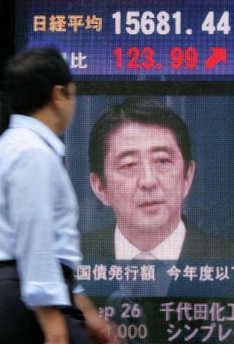Asia-Pacific
Abe vows muscular diplomacy
(Reuters)
Updated: 2006-09-27 11:38
 |
Large Medium Small |
TOKYO - Japan's new prime minister, Shinzo Abe, pledged on Tuesday to boost his country's role in global affairs while trying to improve relations with China, frayed by predecessor Junichiro Koizumi's visits to a Tokyo war shrine.
 A man walks past an electronic board showing the Nikkei average outside a brokerage in Tokyo September 27,2006, the day after Shinzo Abe (displayed on screen) was elected as Japan's new prime minister. [Reuters] |
The hawkish Abe, who at 52 became the youngest Japanese leader since World War Two, also said he wanted to push ahead with the economic reforms begun by Koizumi and revive respect at home for Japan's traditional values and culture.
Relations with China chilled after Koizumi took office in April 2001 and began annual visits to Tokyo's Yasukuni Shrine.
"China's development is a big plus for Japan. I want to make efforts to further develop ties," said Abe, who has backed Koizumi's visits but has declined to say if he would follow suit.
In a sign that China may also want a thaw, Prime Minister Wen Jiabao congratulated Abe, saying developing friendly ties was in the interests of both countries, the region and the world. "I hope to cooperate unceasingly with you for this purpose," Wen said in the message, released by Japan's foreign ministry.
A soft-spoken, popular lawmaker whose grandfather was also prime minister, Abe also reiterated his call for tighter ties with Washington, promised to work towards rewriting Japan's pacifist constitution and to put more discipline in classrooms.
"I want to pursue an assertive diplomacy," Abe told a news conference. "I want to make Japan a beautiful country that is trusted and respected by the countries of the world and in which children can be proud of being born."
He also said he would nurture growth while giving precedence to spending cuts in the struggle to rein in Japan's public debt, the biggest among advanced countries despite Koizumi's efforts to end his party's addiction to wasteful public works.
In a symbolic gesture, Abe said he would cut his own salary, the equivalent of about $358,000, by 30 percent and those of his ministers by 10 percent.
Japan's public debt is almost $6.7 trillion.
Koizumi, a media-savvy maverick known for snappy sound bites and cameo appearances with celebrities, stamped his mark on Japan's political scene after taking power in April 2001 with promises to pry his party loose from the grip of vested interests and lift government's heavy hand from the stalled economy.
NEW CABINET LINE-UP
In a new cabinet announced earlier in the day, outspoken Foreign Minister Taro Aso, 66, who shares many of Abe's conservative views, kept his portfolio, while former defence minister Fumio Kyuma, 65, was named to the defence post.
Koji Omi, 73, a former economic planning agency chief, was named finance minister, while economics professor Hiroko Ota takes over as economics minister.
Abe, who won a party leadership ballot last week, was elected by parliament's lower house, winning 339 votes to 115 for Ichiro Ozawa, 64, leader of the main opposition Democratic Party.
Abe rewarded lawmakers who had campaigned hard in his bid for the premiership, but some said the line-up showed his focus was more on foreign and security affairs than economic matters, which could well be left mainly to bureaucrats to handle.
"There are no shining stars in economic portfolios," said Jesper Koll, chief economist at Merrill Lynch in Tokyo.
Aso keeps his top diplomatic portfolio as Beijing and Tokyo feel their way toward a possible thaw in ties.
Japanese and Chinese diplomats have held talks on a possible resumption of two-way summits not held since April 2005 because of Koizumi's pilgrimages to Yasukuni, where wartime leaders convicted as war criminals by an Allied tribunal are revered along with the nation's war dead.
But gaps remained after the latest round of talks ended in Tokyo on Tuesday.
Many of the new cabinet ministers share Abe's conservative views, including the need to respect Japan's history and culture.
Asked to elaborate on his slogan of building a "Beautiful Country, Japan", Abe said: "It's a country that values beautiful nature and Japan's culture, history and tradition."
"We must reaffirm family values that have been fostered."